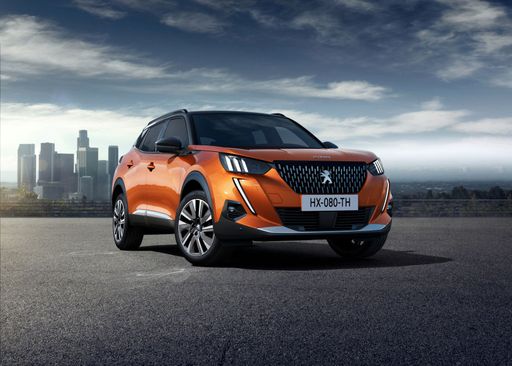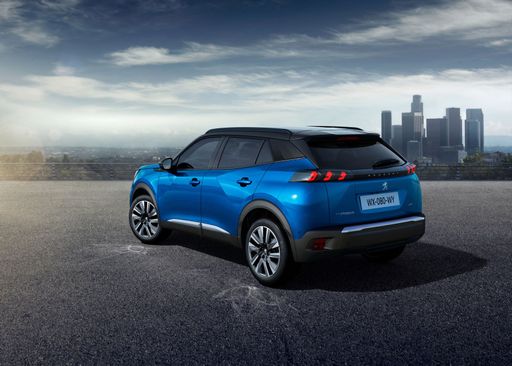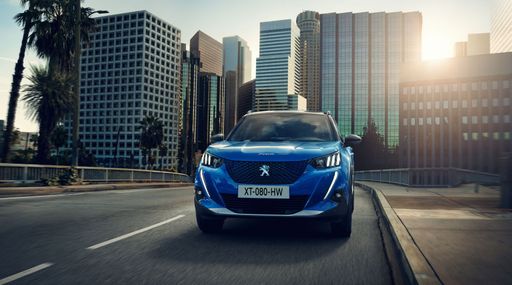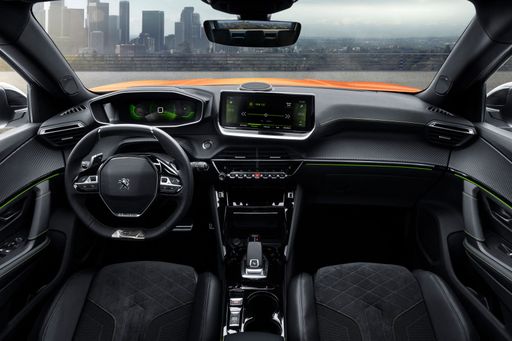Hyundai Kona vs Peugeot 2008 - Differences and prices compared
Compare performance (218 HP vs 156 HP), boot space and price (23100 £ vs 24500 £ ) at a glance. Find out which car is the better choice for you – Hyundai Kona or Peugeot 2008?
Costs and Efficiency:
When it comes to price and running costs, the biggest differences usually appear. This is often where you see which car fits your budget better in the long run.
Hyundai Kona has a slight advantage in terms of price – it starts at 23100 £ , while the Peugeot 2008 costs 24500 £ . That’s a price difference of around 1405 £.
Fuel consumption also shows a difference: Hyundai Kona manages with 4.60 L and is therefore hardly perceptible more efficient than the Peugeot 2008 with 4.90 L. The difference is about 0.30 L per 100 km.
In terms of energy consumption, the advantage goes to the Hyundai Kona: with 14.60 kWh per 100 km, it’s barely noticeable more efficient than the Peugeot 2008 with 15.50 kWh. That’s a difference of about 0.90 kWh.
As for electric range, the Hyundai Kona performs clearly perceptible better – achieving up to 514 km, about 108 km more than the Peugeot 2008.
Engine and Performance:
Power, torque and acceleration are the classic benchmarks for car enthusiasts – and here, some clear differences start to show.
When it comes to engine power, the Hyundai Kona has a clearly perceptible edge – offering 218 HP compared to 156 HP. That’s roughly 62 HP more horsepower.
In acceleration from 0 to 100 km/h, the Hyundai Kona is hardly perceptible quicker – completing the sprint in 7.80 s, while the Peugeot 2008 takes 8.30 s. That’s about 0.50 s faster.
In terms of top speed, the Hyundai Kona performs minimal better – reaching 210 km/h, while the Peugeot 2008 tops out at 206 km/h. The difference is around 4 km/h.
There’s also a difference in torque: Peugeot 2008 pulls minimal stronger with 270 Nm compared to 265 Nm. That’s about 5 Nm difference.
Space and Everyday Use:
Cabin size, boot volume and payload all play a role in everyday practicality. Here, comfort and flexibility make the difference.
Both vehicles offer seating for 5 people.
In curb weight, Peugeot 2008 is barely noticeable lighter – 1263 kg compared to 1370 kg. The difference is around 107 kg.
In terms of boot space, the Hyundai Kona offers barely noticeable more room – 466 L compared to 434 L. That’s a difference of about 32 L.
In maximum load capacity, the Peugeot 2008 performs somewhat better – up to 1467 L, which is about 167 L more than the Hyundai Kona.
When it comes to payload, Hyundai Kona slight takes the win – 490 kg compared to 447 kg. That’s a difference of about 43 kg.
Who wins the race in the data check?
The Hyundai Kona is decisively ahead in the objective data comparison.
This result only shows which model scores more points on paper – not which of the two cars feels right for you.
Costs and Consumption
View detailed analysis
Engine and Performance
View detailed analysis
Dimensions and Body
View detailed analysis

Hyundai Kona
Hyundai Kona
The Hyundai Kona wears its personality on the outside with bold styling and sprightly handling that turns city driving into something a little more fun than a commute. It blends practical space, modern tech and sensible running costs into a compact, stylish package — a smart pick if you want flair without paying luxury prices.
details



Peugeot 2008
The Peugeot 2008 is a stylish, city-friendly crossover that packs big character into a compact package, turning mundane errands into a mildly entertaining drive. Its clever interior layout, polished looks and confident ride make it a smart choice for buyers who want practical daily sense with a touch of flair.
details



Costs and Consumption |
|
|---|---|
|
Price
23100 - 41600 £
|
Price
24500 - 40300 £
|
|
Consumption L/100km
4.6 - 7 L
|
Consumption L/100km
4.9 - 5.7 L
|
|
Consumption kWh/100km
14.6 - 16.8 kWh
|
Consumption kWh/100km
15.50 kWh
|
|
Electric Range
377 - 514 km
|
Electric Range
406 km
|
|
Battery Capacity
1.3 - 65.4 kWh
|
Battery Capacity
51 kWh
|
|
co2
0 - 163 g/km
|
co2
0 - 129 g/km
|
|
Fuel tank capacity
38 - 47 L
|
Fuel tank capacity
44 L
|
Dimensions and Body |
|
|---|---|
|
Body Type
SUV
|
Body Type
SUV
|
|
Seats
5
|
Seats
5
|
|
Doors
5
|
Doors
5
|
|
Curb weight
1370 - 1773 kg
|
Curb weight
1263 - 1623 kg
|
|
Trunk capacity
466 L
|
Trunk capacity
434 L
|
|
Length
4350 - 4385 mm
|
Length
4304 mm
|
|
Width
1825 mm
|
Width
1770 mm
|
|
Height
1580 - 1585 mm
|
Height
1523 mm
|
|
Max trunk capacity
1300 L
|
Max trunk capacity
1467 L
|
|
Payload
420 - 490 kg
|
Payload
407 - 447 kg
|
Engine and Performance |
|
|---|---|
|
Engine Type
Electric, Petrol, Full Hybrid
|
Engine Type
Electric, Petrol MHEV, Petrol
|
|
Transmission
Automatic, Manuel
|
Transmission
Automatic, Manuel
|
|
Transmission Detail
Reduction Gearbox, Manual Gearbox, Dual-Clutch Automatic
|
Transmission Detail
Reduction Gearbox, Dual-Clutch Automatic, Manual Gearbox
|
|
Drive Type
Front-Wheel Drive, All-Wheel Drive
|
Drive Type
Front-Wheel Drive
|
|
Power HP
115 - 218 HP
|
Power HP
101 - 156 HP
|
|
Acceleration 0-100km/h
7.8 - 11.9 s
|
Acceleration 0-100km/h
8.3 - 10.9 s
|
|
Max Speed
162 - 210 km/h
|
Max Speed
150 - 206 km/h
|
|
Torque
200 - 265 Nm
|
Torque
205 - 270 Nm
|
|
Number of Cylinders
3 - 4
|
Number of Cylinders
3
|
|
Power kW
85 - 160 kW
|
Power kW
74 - 115 kW
|
|
Engine capacity
998 - 1598 cm3
|
Engine capacity
1199 cm3
|
General |
|
|---|---|
|
Model Year
2024 - 2025
|
Model Year
2023 - 2025
|
|
CO2 Efficiency Class
A, D, C, E, F
|
CO2 Efficiency Class
A, C, D
|
|
Brand
Hyundai
|
Brand
Peugeot
|
Is the Hyundai Kona offered with different drivetrains?
Available configurations include Front-Wheel Drive or All-Wheel Drive.




